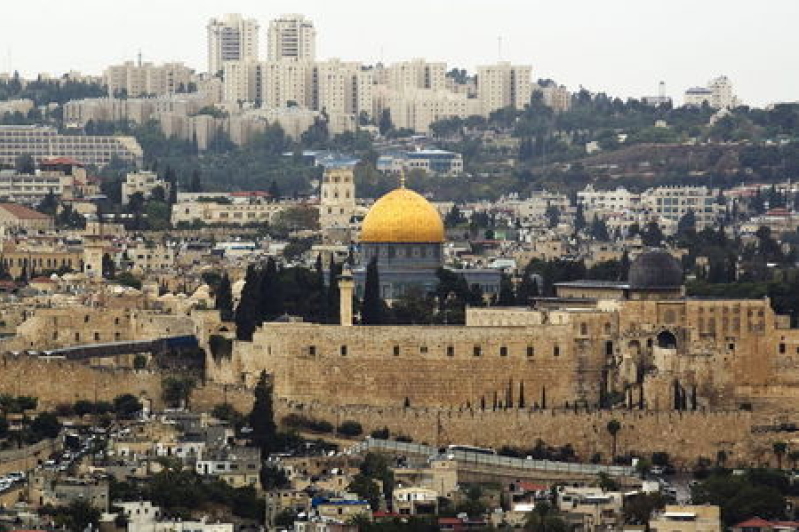
As the group of Orthodox Jews came near the Dome of the Rock in Jerusalem's Old City, one began to mumble while staring down at his mobile phone. Another looked up in awe, eyes half shut in concentration. The woman's lips moved silently.
Asked afterwards whether they had prayed, a violation of an 800-year-old ban on non-Muslim worship at the holy site, two of the group said they had done so in their hearts, while the woman declared proudly: "I prayed with my mouth moving."
Monday's visit to the compound known to Muslims as the Noble Sanctuary and to Jews as Temple Mount was low-key by most standards - no fighting broke out, no one was ejected by the police, everyone left calmly and life returned to normal.
But in critical ways it cut to the heart of an issue fuelling the worst violence between Palestinians and Israel in years: whether the status quo at the site, also known as the Al-Aqsa mosque compound, is being properly enforced.
In a region full of complexity, the Al-Aqsa/Temple Mount status quo occupies a special place. It upholds a rule that has effectively existed since 1187, when Muslim warrior Saladin defeated the Christian crusaders and held on to Jerusalem: non-Muslims may enter the sacred compound, but only Muslims can pray.
Before Muslims built the Dome of the Rock and the Aqsa mosque in the late 7th and early 8th centuries, two Jewish temples, the second destroyed by the Romans in 70 AD, stood at the site, which is both the holiest place in Islam outside Saudi Arabia and the most sacred place in Judaism.
After Israel seized the Old City and East Jerusalem in the 1967 Middle East war, it agreed to continue the status quo, recognizing the risks of igniting a religious war if anything were changed. It gave Jordan special responsibility for overseeing the Muslim holy sites via the Waqf, an Islamic trust.
That agreement was reinforced when Israel signed a peace treaty with Jordan in 1994. There have been many periods of friction over the years, but to all intents and purposes, the status quo has held.
For a special report, see here: http://graphics.thomsonreuters.com/15/05/ISRAEL-JERUSALEM:DOME.pdf
Over the last decade or so, since then Israeli opposition leader Ariel Sharon visited the site in 2000, the Waqf says Israel has been slowly chipping away at the rules, with increasing numbers of religious Jews visiting the area and many of them surreptitiously praying.
Israeli Prime Minister Benjamin Netanyahu has rejected those suggestions, saying repeatedly that the government has not changed the rules and has no intention of doing so.
He reiterated that position after meetings with U.S. Secretary of State John Kerry last week, and Kerry said after talks with Jordan's King Abdullah and Palestinian President Mahmoud Abbas that there was a renewed commitment from all sides to ensure the status quo was respected.
Yet despite the verbal efforts to quell the problem, the Muslim authorities at the site remain convinced the status quo is being slowly eroded by steady Jewish encroachment.
CHANGING TIMES?
In the past, said Sheikh Omar al-Kiswani, the director of the Aqsa mosque, the Waqf was responsible for letting visitors into the compound. But since the mid-2000s, Israeli authorities have taken over. As a result, the Waqf says, more and more religious and ultra-nationalist Jews are visiting as tourists.
The Israeli government points out that only about 12,000 Jews visit the site each year, as against four million Muslims.
Figures from the Israeli police show a steady increase in Israeli Jewish visitors. Combined with that, groups that advocate more Jewish access to the site, and the rebuilding of a Jewish temple there, have become more organized in their efforts, casting it as an issue of religious freedom.
"If a religious war is to be avoided, it is up to Israel to enforce the rules," Sheikh Kiswani told Reuters on Monday.
As well as the increased number of visitors, and the heavy presence of Israeli police and army units to protect them, the Waqf is angry at what it sees as clear efforts to pray.
Before ultra-nationalist or religious Jews enter the site, Israeli guards confiscate any prayer accoutrements they have. They are allowed in only in closely monitored groups of five or ten.
Some walk barefoot on the ancient marble stones in obeisance. Many walk backwards away from the holiest places, never withdrawing their gaze. Others carry mobile phones that they say display prayers on the screen.
While no one prays openly - they are warned and ejected by police if they do - the groups usually drift off into a grove of olive trees at the eastern edge of the compound where more secretive prayer is possible. Some have written on blogs about worshipping there, proud to have violated the rules.
"If they say prayers in their heads, how can we know?" said Nader Shaheen, a Waqf guard, who says he frequently sees Jews praying and is frustrated when the police do nothing.
As the group of Orthodox Jews came to the end of their visit on Monday, they stopped near the Dome of the Rock, close to where Jews believe the Ark of the Covenant once held the stone tablets of the ten commandments inscribed by God. They looked up silently, their faces fixed in concentration.
All around them, kept back by the police, Muslims crowded in, chanting loudly "Allahu-Akbar" (God is Greatest).
(Writing by Luke Baker; Editing by Peter Graff)






